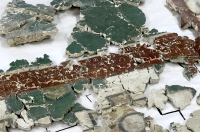The word letopis (plural: letopisi) comes from leto (“summer,” in Old Slavic – “a year”) and pisat’ (“to write”). It refers to manuscripts written by members of the clergy in the 11–18th centuries that described important events taking place in the country’s life. They usually begin with the words “V leto …” (“In the year …”) and, other than text, contain illustrations, ornaments, and beautiful initial letters, which make them not only an invaluable historical source, but also a work of art.
The major events associated with the inception of Russia, such as the summoning of the Varangians and Christianization of Kievan Rus’, are covered in the 11th-century chronicle The Tale of Bygone Years. There were also smaller-scale chronicles covering local events that its author believed to be important enough to write down.
For example, it's from letopisi that we learn that crocodiles once terrorized the dwellers of ancient Russian cities. It’s no joke: both Novgorod and Pskov letopisi of the late 16th century contain records of such an accident. Researchers present different explanations: maybe it was pure fiction or the author rewrote a tale he heard elsewhere (about a place where crocodiles actually do live), maybe there was a real accident but the name of the animal was misused, or perhaps – who knows! – an actual crocodile somehow made it to the North.
This leads us to the question of how reliable such sources are. Historians, obviously, don’t trust them wholeheartedly and thoroughly study the chronicles to separate facts from fiction.
Among the most acknowledged researchers who dealt with this task was Aleksey Shakhmatov. Back in the late 19th–early 20th century, when not all chronicles were even published, he was the first person to come up with a system and a methodology still appreciated today and proved that The Tale of Bygone Years, the oldest letopis known in Russia, wasn’t even the first one: traces of earlier works can be found in later chronicles.
If you feel like learning more about historical manuscripts, check out our recent story on documents before passports.




